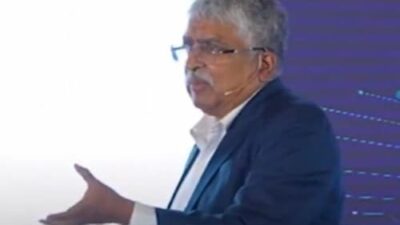In discussions with founders, CEOs, and senior executives of fintech companies, topics included improving the ease of doing business for fintechs and measures to combat financial fraud.
According to a post from the Finance Ministry on X, Sitharaman emphasized continued governmental support for the fintech industry.
The meeting took place during the Digital Payments Awards 2025, attended by Minister of State for Finance Pankaj Chaudhary and M Nagaraju, Secretary of the Department of Financial Services.
While speaking at the Digital Payments Awards 2025 event, she encouraged fintech firms to see rural India as a promising area—viewing it not just as a social responsibility but as an opportunity to tap into new markets.
In just three years, nearly 700 entities in banking, insurance, securities, and pensions joined the Account Aggregator (AA) platform by FY25, a significant increase from only 24 in FY22, she noted.
The number of accounts linked through AA has surged to over 15 crore, up from just 1.5 lakh in FY22, facilitating loans exceeding ₹88,700 crore and assisting almost 1 crore users in personal finance management while reducing onboarding costs for intermediaries, she added.
Citing Prime Minister Narendra Modi, the finance minister remarked that fintech should not only ‘Make in India’ but also ‘Make for the world’.
“In this regard, Indian fintech innovations hold the potential to become global public goods that can aid both emerging and developed economies.
“This will create new markets for our firms…our players must strive to export our successful models globally and capture international markets. We possess the talent, market scale, and proven solutions,” she stated.
Sitharaman urged fintechs to develop solutions to combat digital arrests and cyber frauds
During the meeting, Finance Minister Nirmala Sitharaman called on fintech startups to devise strategies to address the growing issues of digital arrests, scams by unscrupulous operators, and various forms of cyber fraud.
Praising the achievements of fintech companies, the Finance Minister acknowledged their role in advancing financial inclusion and extending the payment system to remote areas of the nation.
While addressing attendees at the Digital Payments Awards 2025 Ceremony, Sitharaman stressed the importance of startups creating solutions to prevent digital arrests and safeguard consumers from deceptive operators.
She also highlighted ‘deep fake’ technology as a significant threat that could inflict considerable harm on the public.
“Today, we must prioritize finding solutions to these challenges, which requires a group of fintech companies dedicated to addressing emerging issues,” Sitharaman stated.
Additionally, she encouraged the fintech industry to expand digital lending services within the crucial MSME sector.
Sitharaman reiterated that Indian fintech innovations could become global public goods, benefiting other economies and creating new markets for domestic firms.
International merchant payments via UPI are now supported at select outlets in seven countries, including Bhutan, France, Mauritius, Nepal, Singapore, Sri Lanka, and the UAE.
“Our firms must strive to share our successful models with the world and seize global market opportunities. We have the necessary talent, market scale, and effective solutions,” she emphasized.
This, she noted, will pave the way for new market opportunities for local firms.
The Indian fintech market is projected to exceed $400 billion by 2028-29.
“That is just three years away, reflecting an expected annual growth of 30%. The scope of opportunity is vast, and I am confident that its best chapters are yet to unfold.
“Let us ‘Innovate, Include, and Inspire’. Fearlessly innovate new solutions, include every citizen in your vision, and inspire the world with India’s achievements,” she urged.
Highlighting that India now accounts for nearly half of all real-time digital transactions globally, she mentioned that the direct benefit transfer (DBT) system has saved substantial amounts by reducing leakages.
Approximately ₹44 lakh crore has been transferred through DBT since 2014, leading to a savings of ₹3.48 lakh crore.
The Minister emphasized that the pace of innovation in India is something many countries can only aspire to.
“Many advanced nations are far from matching the momentum achieved by our fintech companies—not only in advancements within their sectors but also in the creation of entirely new paradigms. This distinctiveness defines the Indian fintech sector,” she remarked.
A World Bank study revealed that through Digital Public Infrastructure (DPI), India attained an 80 percent financial inclusion rate in just six years.
Some experts analyzing this report have suggested that this achievement would typically have taken nearly half a century, Sitharaman concluded.



